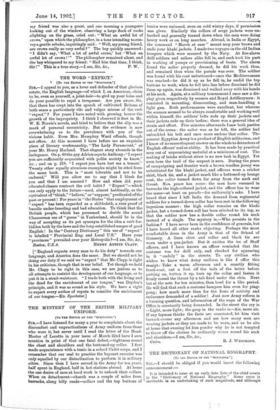THE MYSTERY OF THE BRITISH MILITARY
UNIFORM.
ETO THE EDITOR OF TILE "Sesersrou.")
SIB,—I have listened for many a year to complaints about the discomfort and unpracticalness of Army uniform from those who wore it, but never until I read the letter of the Head- Master of Loretto in your issue of March 22nd have I seen mention in print of that one fatal defect, —tightness round the chest and shoulders and the buttoned-up collar. I first made acquaintance with a tunic in a school Cadet corps, and I remember that our zeal to practise the bayonet exercise was only equalled by our disinclination to perform it in military attire. Since then I have served in the Army for ten years, half spent in England, half in hot stations abroad. At home the one desire of men at hard work is to unhook their collars. When on detachment—church was a couple of miles from barracks, along hilly roads—collars and the top buttons of tunics were unloosed, even on cold wintry days, if permission was given. Similarly the collars of serge jackets were un- hooked and generally turned down when the men were doing heavy work or on long marches. Abroad, in India or Egypt, the command "March at ease" meant mop your brows and undo your khaki jackets. I made two voyages on the old Indian troopers which were manned by the Navy. At fire-alarm drill soldiers and sailors alike fell in, and each took his part in working of pumps or provisioning of boats. The alarm found the sailor properly dressed, he did his work thus, and remained thus when the parade was over. The soldier was found with his coat unbuttoned—once the Mediterranean was reached—he did it up as he fell in, he undid the top buttons to work, when he fell into line before dismissal he did them up again, was dismissed and walked away with his bands at his neck. Again, at a military tournament I once saw a dis- play given respectively by seamen and Royal Artillerymen: it
consisted in mounting, dismounting, and man-handling a light gun. Both performances were excellent, but whereas the seaman seemed to be always comfortable and working well within himself, the soldiers' belts rode up their jackets and their jackets rode up their bodies; there was a general idea of strain and effort. Five minutes afterwards I saw both parties out of the arena : the sailor was as he left, the soldier had unbuckled his belt and once more undone that collar. The present Egyptian Army is a product of English militarism, and I know of no more eloquent answer on the whole to detractors of English officers' zeal or ability. It has been made by practical men out of unpromising material at a minimum of cost. The making of bricks without straw is no new task in Egypt. Yet even here the trail of the serpent is seen. During the years of campaigning and frontier work a brown woollen jersey was substituted for the khaki jacket, and officers wore a cricket shirt, black tie, and a jacket much like a buttoned-up lounge coat, the collar turned down far away from the neck and throat. Now peace has come : the men have resumed in barracks the high-collared jacket, and the officer has to wear the same—at least on parade—for uniformity's sake. I have heard that since I left India the demand from regimental soldiers for a turned-down collar has been met in the following ingenious manner : the high collar remains on the khaki jacket, but a turned-down roll has been stitched to its top, so that the soldier now has a double collar round his neck instead of a single. The mystery is,—Who persists in the fashion ? I have never been in the confidence of generals, but I have heard all other ranks objecting. Perhaps the most comfortable dress in the Army is that of the School of Gunnery. A linen shirt and collar and black tie are worn under a pea-jacket. But it excites the ire of Staff officers, and I have known an officer reminded that the costume was for drill only, and checked for appearing in it " unduly " in the streets. To any civilian who wishes to know what Army uniform is like I offer this receipt: Take a warm afternoon and a smartly fitting frock-coat, cut a foot off the tails of the latter before putting on, button it up, turn up the collar and fasten it firmly round the throat by a tab fixed under the chin. Next bat at the nets for ten minutes, then bowl for a like period. He will find that such a costume hampers him even for ping. pong; how much more then for the feats of activity and endurance demanded of a soldier! Just now Army reform is a burning question, and information of the ways of the War Office is constantly being demanded. In the street the cry is —Light, more light; the gasp in the ranks is—Air, more air. If any layman thinks the facts are overstated, let him visit barrack-rooms any afternoon and see how many men are wearing jackets as they are made to be worn, and as he sits at home that evening let him ponder why he is not tempted to throw off the clothes he ordinarily wears round his neck and shoulders.—I am, Sir, &c.,










































 Previous page
Previous page